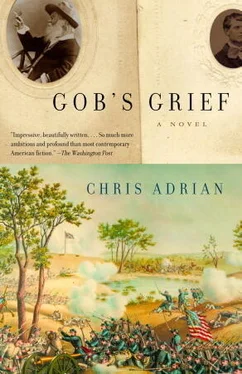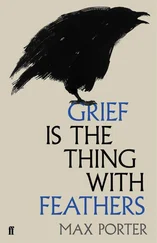“My brother,” said Pickie Beecher, “he wants a bigger room.”
“Hello?” said Tennie. “Can you hear me?” Will took the tin can from his ear and spoke into it.
“Yes,” he said. They were talking over a lovers’ telegraph, two cans connected by a string. Tennie was in her Turkish corner, where she’d closed up her silk tent against him, insisting they play with her toy, something Gob had put together in the kitchen downstairs.
“Can you hear them?” she asked. “All those Irish innocents?”
“No,” he said. It was July, just after the great slaughter on Eighth Avenue. Angry Catholics had disturbed the gloating parade of the Orangemen and been punished with bullets by the police. Forty-five people had died. Will had seen a few of the wounded at Bellevue, which was also where all the bodies of the dead had been taken. He had stood that afternoon at a window on the second floor and looked down where twenty thousand mourners gathered outside the morgue.
“They are still angry,” she said. Then she stuck her head out of the tent and called out, “You may come in, if you bring me fruit.” He went in search of it. As he passed a window in the hall, he heard laughter coming down from the roof. Mrs. Woodhull was up there with her new friend, Mr. Tilton. He’d come to see her for the first time in May. Pickie Beecher seemed to hate him. Whenever they happened to be in the same room, Pickie Beecher would confront him, saying, “You are not my father.” Mr. Tilton always laughed at him and agreed that he was not.
Tilton was in love. He’d come to the house as Henry Beecher’s agent when Gob’s mother made a veiled threat to expose Beecher’s affair with Mrs. Tilton. He was supposed to soothe her, but she soothed him better. They were devoted companions.
Gob’s father was in the kitchen, sitting alone in the dark. “My boy,” he said to Will. “I am on the ceiling. Could you help me get down?” He had his pharmacopoeia, a dark wooden box, in front of him. Most doctors stocked theirs with a variety of medicines, but Canning Woodhull kept only morphine in his. “I find it cures everything but constipation,” he’d said of it. Will turned up the light to better examine the fruit and pick out the best pieces. Canning Woodhull’s eyes were eerie — wide, round, and almost all blue, with pupils closed down to the size of a dot of ink. He reached out to Will and said, “Give me your hand, my friend, before I float away.” Will put out his hand. Woodhull took it, shaking it as if in greeting, but also pulling on it, slow and steady. “There,” he said. “That’s better. How are you feeling this evening.”
“Very well,” said Will.
“I am not! My friend Colonel Blood says a person ought not to pluck the wings from his butterfly, but it seems to me that he is a man who doesn’t know if his grapes are sweet or sour. Colonel Blood is in the blood, you see. We are in it, but sometimes I float above. It ought to be contained in bodies. Do you know Sydenham? I used to worship him. But who cares about the mysteries of the circulation when the blood will come out, anyhow? We will put it on the ground until it drowns us. Vicky! Now there’s a woman possessed of a natural and indefatigable buoyancy. Tell me, do you think she will love me again?”
“Let go my hand,” Will said.
“If you let me go, you’ll drown. My floating is all that’s holding you up.” Will pulled his hand away roughly.
“Good evening,” Will said, after he’d grabbed up some fruit.
“I tried,” said Canning Woodhull. “I tried to save you.”
Gob and Pickie Beecher consulted at a speed Will could not follow, and in a language he often failed to comprehend. Pickie Beecher talked rapidly of how his brother had fifty toes or a caterpillar in his throat, and every revelation sent Gob into an ecstasy of drawing and calculation. The machine was taking shape again, not as a person anymore, but as an edifice, growing into the walls and through the floor. Will had gone into the workshop one morning to find holes bored into the floor — they were all over the room, at least a hundred of them, rough around their edges as if something had gnawed them in the stone and the wood. Gob and Pickie Beecher were busy threading cables through the holes. They dangled in the bedrooms beneath the workshop, connected to nothing. “Little brother is growing,” said Pickie Beecher.
Will studied dynamos, because Pickie Beecher had obtained three and deposited them in a parlor. All the furniture had been pushed to the wall to make room for them. They were arranged in a circle, so they seemed to be in silent conversation with each other, each of them chaperoned by the engine that powered it. Will was fond of their principle, of how the current produced in the revolving armature was sent back through the field coils of the electromagnet, increasing its power, which in turn increased the current. It was a building-up process of mutual and reciprocal excitation, and it reminded him of Tennie, because kissing her brought this principle to his mind. While Gob and Pickie Beecher consulted upstairs, Will made an accidental discovery: when he connected one dynamo to another already in operation, the second began to revolve in a direction opposite from the first.
“You are a genius!” Gob proclaimed, when Will showed him.
Pickie Beecher scampered around the two linked dynamos and said, “My brother, he has two hearts!” He stretched his little hand towards the brushes of one dynamo. Will rushed to stop him but was too late. He was sure the little fellow would be cooked alive, but the fat spark and the shock only made him giggle. “It’s my brother,” he said, when Will scolded him. “He wouldn’t hurt me. Not ever.”
Sometimes Pickie Beecher acted like an ordinary child. Sometimes he eschewed blood on his ice cream, and sometimes he clamored for a bedtime story or a stick of plain candy. He liked animals. He liked to go to the menagerie in Central Park and visit a hippopotamus with whom he had formed an attachment. Will took him down there one day in the middle of August.
Pickie knew just where his hippo’s cage was. He ran to it and grabbed the bars. “Murphy!” he said. “Hello, sir.” Will came up behind him and looked into the cage. Murphy looked fat and sleepy, and not entirely well, but better than most of his peers. Pickie rolled a piece of chocolate towards him. He snapped it up without even looking to see what it was.
They strolled among the other cages. Pickie paused before a skinny tiger.
“He would eat me up, if he could break his cage,” he said.
“I think he would try,” said Will. “He has that reputation. But I would protect you.” Yet it seemed unlikely that the boy would need his protection.
They visited a balding lion, and cage after cage of hissing, spitting monkeys. Pickie said he wanted one for a pet. Will said they were dirty, mean animals, and that he’d be happier with his hippo.
“I would make them serve me,” said Pickie. “They would be useful.”
Will sat down while Pickie ran from cage to cage, gibbering at the monkeys, roaring at the monstrous cats, and reaching his small hands through a cage to pinch the noses of deer.
All his running made Pickie hungry, so Will took him east to the Dairy, where they shared a bowl of ice cream. Pickie took no interest in the nearby playground, or in the children playing there. All he wanted was a ride in a goat cart. Will gave him ten cents and he ran off to clamber into a little buggy, pulled by two goats and captained by a black-haired gypsy boy. Not long after it began, the ride ended in an argument: the gypsy boy accused Pickie of biting his goat.
Will took Pickie up to the lake, because he had the idea that they could both take off their shoes and dip their feet in the water, but Pickie would have none of that. So they sat watching the lazy motion of the pleasure boats, and the boy said many times how he would like to have a swan to love and to pet and to eat. Will ignored him, because his attention was captured by a young couple in one of the boats, whom he mistook for Gob and Miss Trufant, but when they drifted closer he saw that it was not they. Will had seen them here before, though, chaperoning Mrs. Woodhull as she floated conspicuously with her paramour, Mr. Tilton. Gob had begun to follow Miss Trufant that summer, going wherever she went, and when Will had asked him why he did it, he’d only say, “I must.” Now Gob was done with his secret pursuit, and he and Miss Trufant walked openly all over the city, keeping an eye on Mrs. Woodhull and, Will supposed, talking about the Fourteenth Amendment.
Читать дальше












